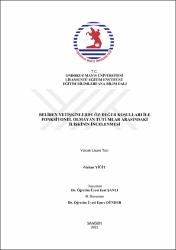Beliren yetişkinlerde öz-değer koşulları ile fonksiyonel olmayan tutumlar arasındaki ilişkinin incelenmesi
Künye
Yiğit, A. (2021). Beliren yetişkinlerde öz-değer koşulları ile fonksiyonel olmayan tutumlar arasındaki ilişkinin incelenmesi. (Yüksek lisans tezi). Ondokuz Mayıs Üniversitesi, Samsun.Özet
Bu araştırmada, Beliren Yetişkinlerin Öz-Değer Koşulları ile Fonksiyonel
Olmayan Tutumlara arasındaki ilişkinin incelenmesi amaçlanmıştır. Nicel araştırma
yöntemlerinden betimsel tarama yöntemi kullanılmıştır. Üniversite eğitimine devam
etmekte olan bireylerle yürütülen bu çalışmada basit seçkisiz örneklem kullanılmıştır.
Üniversite eğitimine devam eden 218 erkek ve 434 kadın olmak üzere 652 katılımcıyla
çalışma yürütülmüştür. Kişisel Bilgi Formu, Koşullu Öz-Değer ve Fonksiyonel
Olmayan Tutumlar ölçekleri kullanılmıştır. Verilerin analizinde Mann-Whitney U
analizi, Kruskal-Wallis analizi, Yapısal Eşitlik Modeli analizleri uygulanmıştır.
Fonksiyonel Olmayan Tutumlar ile cinsiyet, eğitim durumu, algılanan akademik
başarı, yaş, fiziksel görünümden memnun olma durumu, ebeveyn tutumu, anne eğitim
düzeyi, baba eğitim düzeyi ve hayatın anlamı arasında istatistiksel anlamlılık
görülmekteyken gelir düzeyi ve çocukluk yaşantısının geçtiği yer arasında anlamlı
farklılık görülmemektedir. Araştırma sonucunda Öz-Değer Koşulları ile Fonksiyonel
Olmayan Tutumlar arasındaki ilişkiyi incelemek için geliştirilen Model-3’ün anlamlı
olduğu bulunmuştur. Onay Alma ve Aile Desteği faktörleri Onaylanma İhtiyacı
üzerinde pozitif istatistiksel anlamlı etkiye sahiptir. Onay Alma ile Rekabet faktörleri
Değişken Tutum üzerinde pozitif, Fiziksel Görünüm ise negatif istatistiksel anlamlı
etkiye sahiptir. Tanrı Sevgisi ile Akademik Yeterlilik faktörleri Bağımsız/Otonom
Tutum üzerinde negatif, Erdem ise pozitif istatistiksel anlamlı etkiye sahiptir. Tanrı
Sevgisi ile Fiziksel Görünüm faktörleri Mükemmelci Tutum üzerinde pozitif, Erdem
ise negatif istatistiksel anlamlı etkiye sahiptir. Bu sonuçlardan yola çıkarak,
Fonksiyonel olmayan tutumların belirlenmesinde, demografik bilgilerin ve bireyin özdeğer koşullarının önemli bir etkiye sahip olduğu anlaşılmaktadır. Tüm bu bilgiler alan
yazın ışığında tartışılmış ve ilgililere araştırma sonuçlarına bağlı önerilerde
bulunulmuştur. In this study, it was aimed to examine the relationship between contingent selfworth of emerging adults and their dysfunctional attitudes. Descriptive scanning
method was used from quantitative research methods. In this study simple random
sampling was used and conducted with individuals who are continuing their university
education. The study was conducted with 652 participants, 218 men and 434 women
who continued their university education. Personal data form, contingent self-worth
and dysfunctional attitudes scales were used. Mann-Whitney U analysis, KruskalWallis analysis, structural equation modeling analysis were applied in the analysis of
the data. Dysfunctional attitudes with gender, educational status, perceived academic
achievement, age, the state of being satisfied with physical appearance, parental
attitude, mother's education level, father education level is observed between statistical
significance and the meaning of life while childhood experiences and the occurrence
of a significant difference between the level of income is not observed. As a result of
the research, the Model-3 developed to study the relationship between self-worth
conditions and dysfunctional attitudes was found to be significant. Approval and
Family Support factors have a positive statistically significant effect on the need for
approval. Competition factors with approval have a positive effect on variable attitude,
and physical appearance has a negative statistically significant effect. Academic
competence factors with the love of God have a negative effect on
independent/autonomous attitude, while virtue has a positive statistically significant
effect. Physical appearance factors with the love of God have a positive effect on the
perfectionist attitude, and virtue has a negative statistically significant effect. Based on
these results, it is understood that demographic information and individual contingent
self-worth have a significant influence in determining non-functional attitudes. All this
information was discussed in the light of the literature and suggestions were made to
the interested parties related to the results of the research.
















